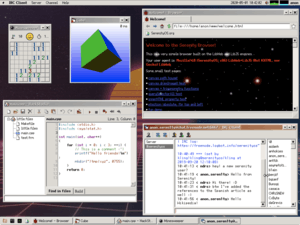SerenityOS
SerenityOS is a free and open source operating system created by Andreas Kling.[1] It is designed to be a Unix-like operating system that draws inspiration from the graphical user interface of the 1990s.[2] As a relatively new operating system, rapid progress is being made in its development. Some of its features currently include an integrated development environment, a visual debugger, a web browser with a JavaScript engine, and a graphically oriented desktop shell.[3]
 | |
 | |
| Developer | Andreas Kling |
|---|---|
| Written in | |
| OS family | Unix-like |
| Working state | Current |
| Source model | Open-source |
| Repository | github |
| Available in | English |
| Platforms | IA-32 |
| License | BSD license |
| Official website | www |
History
Kling began writing SerenityOS in mid-2018 after getting out of rehab, and recorded most of the development sessions using screen capture software. He would later start posting these sessions to YouTube. By mid-2019, a GitHub repository was created to facilitate community development of the project. Many people from around the world have joined to contribute to the project. It currently receives major additions from the open source development community every week. Kling has stated that he is surprised by all the development contributions and is constantly reviewing and publishing the work from other contributors.
Features
SerenityOS is designed to be a simple Unix-like operating system inspired by the user interfaces common among desktop computers in the 1990s. Although it is currently being designed as a virtual machine image, it has features such as a 32-bit kernel with preemptive multitasking, an IPv4 networking stack, ext2 file system, a graphical toolkit, and a compositing window manager.[4] Many new features are being added rapidly and Kling has the goal of eventually making SerenityOS his primary operating system, for which he needs it to be self-hosting.
Kling has, among other contributers, demonstrated booting SerenityOS on bare metal[5]
References
- "A programmer developed a new operating system that mimics the 1990s". Tivi Magazine. Retrieved 1 May 2020.
- Gregori, Sven (24 February 2020). "Reaching Serenity: Porting Git To A Homebrew Operating System". Hackday. Retrieved 1 May 2020.
- Jamsek, Mark (18 October 2019). "SerenityOS: A Graphical Unix-like Operating System".
- "Serenity OS – Graphical Unix-like Operating System". Hackers Online Club. 21 October 2019.
- Kling, Andreas (22 September 2019). "Demo: Serenity booting on my PC".